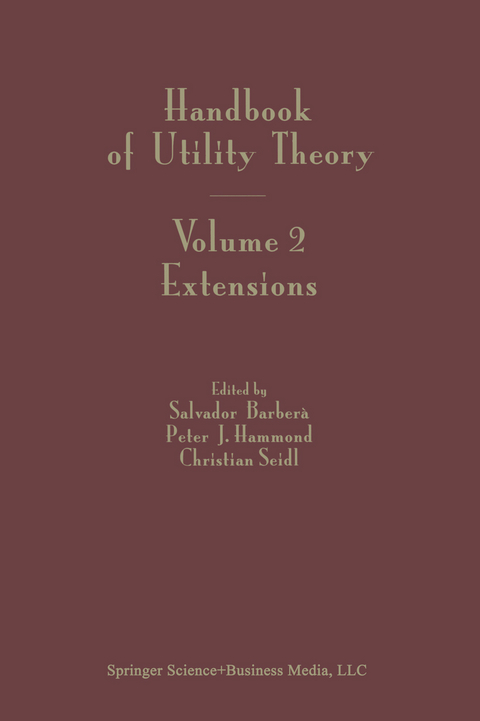
Handbook of Utility Theory
Springer-Verlag New York Inc.
978-1-4419-5417-6 (ISBN)
The standard rationality hypothesis is that behaviour can be represented as the maximization of a suitably restricted utility function. This hypothesis lies at the heart of a large body of recent work in economics, of course, but also in political science, ethics, and other major branches of the social sciences. Though this hypothesis of utility maximization deserves our continued respect, finding further refinements and developing new critiques remain areas of active research. In fact, many fundamental conceptual problems remain unsettled. Where others have been resolved, their resolutions may be too recent to have achieved widespread understanding among social scientists. Last but not least, a growing number of papers attempt to challenge the rationality hypothesis head on, at least in its more orthodox formulation. The main purpose of this Handbook is to make more widely available some recent developments in the area. Yet we are well aware that the final chapter of a handbook like this can never be written as long as the area of research remains active, as is certainly the case with utility theory. The editors originally selected a list of topics that seemed ripe enough at the time that the book was planned. Then they invited contributions from researchers whose work had come to their attention. So the list of topics and contributors is largely the editors' responsibility, although some potential con tributors did decline our invitation. Each chapter has also been refereed, and often significantly revised in the light of the referees' remarks.
14 Alternatives to Expected Utility: Foundations.- 1 Introduction.- 2 Choice Under Risk: The von Neumann-Morgenstern Framework.- 3 Choice Under Uncertainty: The Savage Framework.- 4 Dynamic Choice.- 5 Conclusion.- References.- 15 Alternatives to Expected Utility: Formal Theories.- 1 Introduction.- 2 The General Framework.- 3 Expected Utility Theory.- 4 Generalizations of Expected Utility.- 5 Conclusions.- References.- 16 State-Dependent Utility and Decision Theory.- 1 Technical Summary.- 2 Introduction, Retrospect and Preview.- 3 A General Framework.- 4 Games Against Nature.- 5 Hypothetical Preferences.- 6 Games with Moral Hazard.- 7 Conditional Expected Utility.- 8 Risk Aversion.- 9 Applications: Life Insurance and Value of Life.- 10 Conclusion.- References.- 17 Ranking Sets of Objects.- 1 Introduction.- 2 An Overview.- 3 Complete Uncertainty.- 4 Opportunities.- 5 Sets As Final Outcomes.- 6 Concluding Remarks.- References.- 18 Expected Utility in Non-Cooperative Game Theory.- 1 Introduction and Outline.- 2 Normal Form Invariance.- 3 Objective Probabilities and Best Responses.- 4 Objective Probabilities and Equilibrium.- 5 Perfect and Proper Equilibrium.- 6 Quantal Response Equilibrium.- 7 Beyond Equilibrium.- 8 Subjectively Expected Utility in Game Theory.- 9 Rationalizable Expectations.- 10 Hierarchies of Beliefs.- 11 Trembling Best Responses.- 12 Rationalizable Preferences over Pure Strategies.- 13 Conclusion: Insecure Foundations?.- References.- 19 Utility Theories in Cooperative Games.- 1 Introduction.- 2 Games with Side Payments.- 3 Axiomatic Characterization of Transferable Utility.- 4 Solution Concepts for Games with Side Payments.- 5 Games Without Side Payments and Some Solution Concepts.- References.- 20 Utility in Social Choice.- 1 Introduction.- 2 Welfarism.- 3 Social Welfare Orderings.- 4 Utility Comparisons Using Invariance Transforms.- 5 Utility Comparisons As Meaningful Statements.- 6 Cardinal Measurability and Full Comparability.- 7 Cardinal Measurability and Unit Comparability.- 8 Translation-Scale Measurability.- 9 Ordinal Measurability and Full Comparability.- 10 Ordinal and Cardinal Measurability.- 11 Ratio-Scale Measurability.- 12 Two-Person Situations.- 13 Separability.- 14 Variable-Population Social Choice.- 15 Concluding Remarks.- References.- 21 Interpersonally Comparable Utility.- 1 Introduction and Outline.- 2 Welfare Economics.- 3 Social Choice without Interpersonal Comparisons.- 4 Social Choice with Interpersonal Comparisons.- 5 The Basis of Interpersonal Comparisons.- 6 Interpersonally Comparable Measures of Economic Welfare.- 7 A Generalized Utilitarianism.- 8 Concluding Remarks.- References.- Name Index.
| Erscheint lt. Verlag | 5.11.2010 |
|---|---|
| Zusatzinfo | XII, 626 p. |
| Verlagsort | New York, NY |
| Sprache | englisch |
| Maße | 155 x 235 mm |
| Themenwelt | Wirtschaft ► Allgemeines / Lexika |
| Wirtschaft ► Betriebswirtschaft / Management ► Unternehmensführung / Management | |
| Wirtschaft ► Volkswirtschaftslehre ► Mikroökonomie | |
| ISBN-10 | 1-4419-5417-1 / 1441954171 |
| ISBN-13 | 978-1-4419-5417-6 / 9781441954176 |
| Zustand | Neuware |
| Haben Sie eine Frage zum Produkt? |
aus dem Bereich


